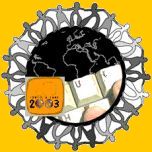

Berichte
WSF KARACHI ENDS: "THE FIRST STEP HAS BEEN MADE"
(from Zofeen T Ebrahim, IPS/TerraViva)
Karachi - Climbing up the steps leading to the amphitheatre at the KMC Sports Complex where the closing was being held, the sudden emptiness of the wall where life-size photographs of street children (an uncomfortable reminder of the grim life that exists for our future generation outside the venue) had been mounted for the past five days glares back at participants.
Once inside, you could feel the energy that seemed to exude and engulfed you completely. You almost felt the other world was possible. With people waving TerraViva, for a minute I thought they were beckoning me, but soon realised it was coming in useful as a hand fan. Twelve noon was not the best of times to be holding the closing WSF ceremony.
Amidst the din of song and dance and laughter and congratulatory notes read out by delegates including young participants from Iraq, Palestine, Bangladesh, India, Nepal and Afghanistan, a last few shots were being taken of friendships that have happened, email addresses being scribbled on scraps of paper. Thankfully the closing plenary was not just clichés, rhetoric and tall claims. Instead of WSF bigwigs, the closing was more or less dominated by young people from around the world who spoke their mind.
Tonight, Karamat Ali, the man behind this forum, and the huge force of workers he was able to gather, will sleep fitfully. "The first step has already been taken. I can foresee an immediate impact. People who had been struggling and were so disconnected feel energized anew. This is not a mean achievement," he told TerraViva while waiting for his turn to say a few words at the closing.
While Palestinian peace activist Jamal Juma agreed that the platform provided a good opportunity to interact and glean more support for the Palestinian cause, he was also fearful that if all the "the lessons learnt are not quickly translated into actions, this would’ve been an exercise in futility."
While lots of papers were ready, what he found missing was strategies, workplans and solutions."
To that, Ali explained: "Before actions take place, people have to understand the issues. They also have to be convinced. And for that kind of struggle, along with hope numbers are important and that comes from people. This experience and the contacts and networking will stay with them forever."
Naveed Baseer, a trade unionist for one, says the event was a huge success. "We had for far too long been busy with slogan-mongering. We got some direction on how to re- strategise. We have to work on the micro level, but at the same time increase our intellectual level too. We have interacted with other workers and shared lessons. If change has to happen our intervention must target state policies. We have to demand transparency and accountability."
"Viva Karachi, viva Pakistan, viva Nairobi!" Wahu Kaar, a member of WSF’s International Organising Committee, said, refusing to believe that there are any difference in this world other than between the rich and the poor.
"The daily drudgery and struggle, encompassing poverty, exclusion of the majority from decision-making and the spirit to survive is the same, whether we’re in Karachi or Nairobi. The struggle has to continue, and the process of finding solutions will now find a new venue – Nairobi," she said. Nairobi will be the venue for the next WSF in January 2007.
Explaining the common ground between the resistance in Palestine and Iraq, young Iraqi Caoiwhe Butterly, who works with trade unions, said: "I am completely overwhelmed by the experience. I know how moved and inspired our Iraqi comrades would’ve been if they could have been here and seen how the Pakistani people are vehemently supporting our causes."
"We never talk about the majority, that I see here," one of the guests at the closing, J P Dardaud, president of the Freres des Hommes, from France, said, he came to Pakistan with the usual perception fed by the media of a country that dealt in "arms selling" had a "military regime", "a hub of Al Qaeda, etc".
He is going with away with a different snapshot of Pakistan altogether. "The pressure that civil society is confronted with here, with state suppression and control and violence perpetrated by both the state and the uncivil groups, is mammoth. To even survive under the circumstances is difficult and here I see so much vibrancy. I get the impression that it’s very robust. Compared to you, ours is quite dull. Ours is a very naive perception."




